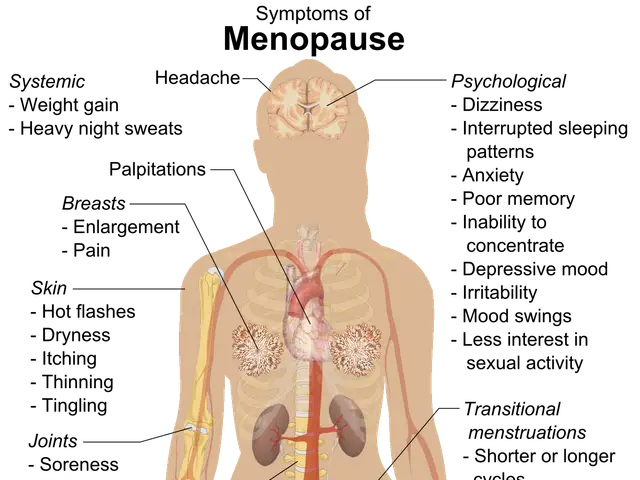Prostate enlargement treatments and recommended lifestyle adjustments
In the realm of men's health, benign prostatic hyperplasia (BPH) is a common condition that affects a significant number of older males. This article explores natural treatment options for BPH, focusing on dietary modifications, lifestyle adjustments, and certain supplements.
BPH, an enlarged prostate, can place pressure on the bladder and the urethra, leading to a variety of unpleasant symptoms such as frequent urination, difficulty starting urination, and inability to empty the bladder completely.
To combat these symptoms, several natural strategies can be employed. One such strategy involves making dietary changes. Reducing the intake of saturated fats, particularly from animal and dairy sources, is recommended, as high-fat diets are linked to a greater likelihood of developing BPH. Instead, opt for healthy fats from oily fish, nuts, and seeds, which have anti-inflammatory effects.
Increasing vegetable consumption is also beneficial for prostate health and may help manage BPH symptoms. Maintaining stable blood sugar levels is crucial, as refined carbohydrates and sugars can lead to insulin spikes that may increase DHT, a hormone that stimulates prostate growth. Limiting evening fluid intake, avoiding alcohol and caffeine, and adopting scheduled voiding habits can also help reduce urinary symptoms.
Regular exercise and maintaining a healthy weight are also essential, as obesity can exacerbate BPH symptoms.
In addition to dietary modifications, certain supplements and natural remedies have shown promise in treating BPH symptoms. Saw palmetto, a popular herbal supplement, is thought to improve urine flow and reduce inflammation, although scientific evidence is mixed. Beta-sitosterol, a plant sterol found in foods and supplements, may help alleviate urinary symptoms. Pygeum, an extract from the African plum tree bark, is another supplement used to reduce urinary issues associated with BPH. Zinc-rich foods, like oysters, pumpkin seeds, lentils, and eggs, are important because zinc helps block conversion of testosterone to DHT, potentially slowing prostate enlargement.
While these supplements are commonly used, their effectiveness varies, and they should be taken under medical guidance.
In conclusion, a combination of dietary improvements, lifestyle adjustments, and select supplements can be effective natural strategies to manage BPH symptoms and possibly slow progression. However, consulting a healthcare professional before starting any new treatment plan is important to ensure safety and appropriateness for your individual condition.
References: [1] Mayo Clinic. (2021). Benign Prostatic Hyperplasia (BPH). Retrieved from https://www.mayoclinic.org/diseases-conditions/benign-prostatic-hyperplasia/diagnosis-treatment/drc-20371641 [2] National Institute of Diabetes and Digestive and Kidney Diseases. (2021). Benign Prostatic Hyperplasia (BPH). Retrieved from https://www.niddk.nih.gov/health-information/urologic-diseases/prostate-problems/benign-prostatic-hyperplasia-bph [3] WebMD. (2021). Benign Prostatic Hyperplasia (BPH). Retrieved from https://www.webmd.com/men/benign-prostatic-hyperplasia-bph [4] Cleveland Clinic. (2021). Benign Prostatic Hyperplasia (BPH). Retrieved from https://my.clevelandclinic.org/health/diseases/14783-benign-prostatic-hyperplasia-bph
- Science suggests that adopting a diet low in saturated fats, particularly from animal and dairy sources, and high in vegetables, healthy fats from oily fish, nuts, and seeds, can help manage symptoms of benign prostatic hyperplasia (BPH).
- Maintaining stable blood sugar levels is crucial in BPH management, as refined carbohydrates and sugars may increase DHT, a hormone that stimulates prostate growth.
- Regular fitness and exercise, along with maintaining a healthy weight, are essential for overall men's health, including managing BPH symptoms.
- Certain supplements, such as saw palmetto, beta-sitosterol, pygeum, and zinc-rich foods, have shown promise in treating BPH symptoms, although their effectiveness varies.
- Incorporating mental health strategies, like stress management and mindfulness, into one's health and wellness routine may also provide additional benefits for BPH management.
- The use of cbd, a popular natural remedy, is currently under investigation for potential benefits in managing BPH symptoms, but more research is needed to understand its effectiveness and safety.







